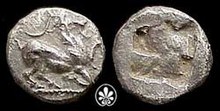Caranus of Macedon
This article's factual accuracy is disputed. (November 2013) |
| Caranus | |
|---|---|
| King of Macedon | |
 Pre 500 BC Aigai Trihemiobol associated with the Karanos Oracle | |
| Reign | unknown |
| Successor | Coenus |
| Issue | Coenus |
| Dynasty | Argead |
| Father | Temenus |
| Religion | Ancient Greek religion |
Caranus or Karanos (‹See Tfd›Greek: Κάρανος) was the first king of the ancient Greek kingdom of Macedon according to later traditions. According to Herodotus, however, the first king was Perdiccas I. Caranus is first reported by Theopompus[1] (FGrH, No. 115, Frag. 393) and is the mythical founder of the Argead dynasty.[2][3]

Myth
According to a Greek myth, Caranus was the son of Temenus,[citation needed] king of Argos, who in turn was a Heraclid, a descendant of Heracles. Plutarch agrees on the Heraclid lineage of Caranus and argues that Alexander the Great is a descendant of Heracles through Caranus.[4] Temenus, along with Cresphontes and Aristodemus were the three Doric leaders who invaded the Mycenean Peloponnese region. Then they proceeded to divide the conquered territories between them. Cresphontes was given Messenia and Sparta; Aristodemus took Laconia; and finally Temenus was given Argos. Following the death of Temenus, the princes argued about who should be king. One of them, Pheidon, defeated his brothers in battle and took over the kingship. Caranus then decided to find another kingdom of his own, where he could be king. First, however he went to the Oracle of Delphi to ask Pythia's advice. "You should find your kingdom there, where you will find plenty of game and domestic animals, she advised." Thus Caranus and his entourage moved to the North, in search of suitable land to establish his new kingdom. Finally, he discovered a green valley, with a lot of game and goats, whereupon he thought that the prophecy of Pythia had been fulfilled. Thus he built a city there, which he named Aigai (Template:Lang-el), present day Vergina, a site of substantial archaeological activity, as numerous important findings have been unearthed.
View of historians
According to Justin (7.1) citing Marsyas of Pella
Caranus also came to Emathia with a large band of Greeks, being instructed by an oracle to seek a home in Macedonia. Here, following a herd of goats running from a downpour, he seized the city of Edessa, the inhabitants being taken unawares because of heavy rain and dense fog. Remembering the oracle’s command to follow the lead of goats in his quest for an empire, Caranus established the city as his capital, and thereafter he made it a solemn observance, wheresoever he took his army, to keep those same goats before his standards in order to have as leaders in his exploits the animals which he had had with him to found the kingdom. He gave the city of Edessa the name Aegae and its people the name Aegeads in memory of this service
According to Chronicon (Eusebius)
Before the first Olympiad, Caranus was moved by ambition to collect forces from the Argives and from the rest of the Peloponnese, in order to lead an army into the territory of the Macedonians. At that time the king of the Orestae was at war with his neighbours, the Eordaei, and he called on Caranus to come to his aid, promising to give him half of his territory in return, if the Orestae were successful. The king kept his promise, and Caranus took possession of the territory; he reigned there for 30 years, until he died in old age. He was succeeded by his son Coenus, who was king for 28 years
According to Livy (The History of Rome, 45.9.3)
From Caranus, the first king, twenty monarchs are enumerated down to Perseus
See also
References
- ^ Theopompus the Historian, Page 270 By Gordon Spencer Shrimpton ISBN 0-7735-0837-6
- ^ Peter Green, Alexander of Macedon, 356–323 B.C.: A Historical Biography, University of California Press, 2013, p.103
- ^ According to Pausanias (Description of Greece, 9.40, 8-9), Caranus set up a trophy after the Argive fashion for a victory against Cisseus: "The Macedonians say that Caranus, king of Macedonia, overcame a chieftain in a bordering country in the battle of Cisseus. For his victory Caranus set up a trophy after the Argive fashion, but it is said to have been upset by a lion from Olympus, which then vanished. Caranus realized that it was a mistaken policy to incur the undying hatred of the non-Greeks dwelling around, and so the rule was adopted that no king of Macedonia, neither Caranus himself nor any of his successors, should set up trophies, if they were ever to gain the good-will of their neighbors. This story is confirmed by the fact that Alexander set up no trophies, neither for his victory over Dareius nor for those he won in India."
- ^ Plutarch, Alexander, 2.1

